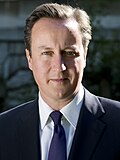| |||||||||||||||||||||||||||||||||||||||||||||||||
All 533 English seats to the House of Commons 267 seats needed for English majority | |||||||||||||||||||||||||||||||||||||||||||||||||
|---|---|---|---|---|---|---|---|---|---|---|---|---|---|---|---|---|---|---|---|---|---|---|---|---|---|---|---|---|---|---|---|---|---|---|---|---|---|---|---|---|---|---|---|---|---|---|---|---|---|
| |||||||||||||||||||||||||||||||||||||||||||||||||
 A map of English parliamentary constituencies *Seat figure does not include the Speaker of the House of Commons, John Bercow, who was included in the Conservative seat total by some media outlets. †Owing to electoral boundaries changing, this figure is notional. | |||||||||||||||||||||||||||||||||||||||||||||||||
These are the results of the 2010 United Kingdom general election in England. The election was held on 6 May 2010 and all 533 seats in England were contested. The Conservative Party achieved a complete majority of English seats, but fared less well in Scotland and Wales, so a coalition government was subsequently formed between the Conservatives and the Liberal Democrats.


